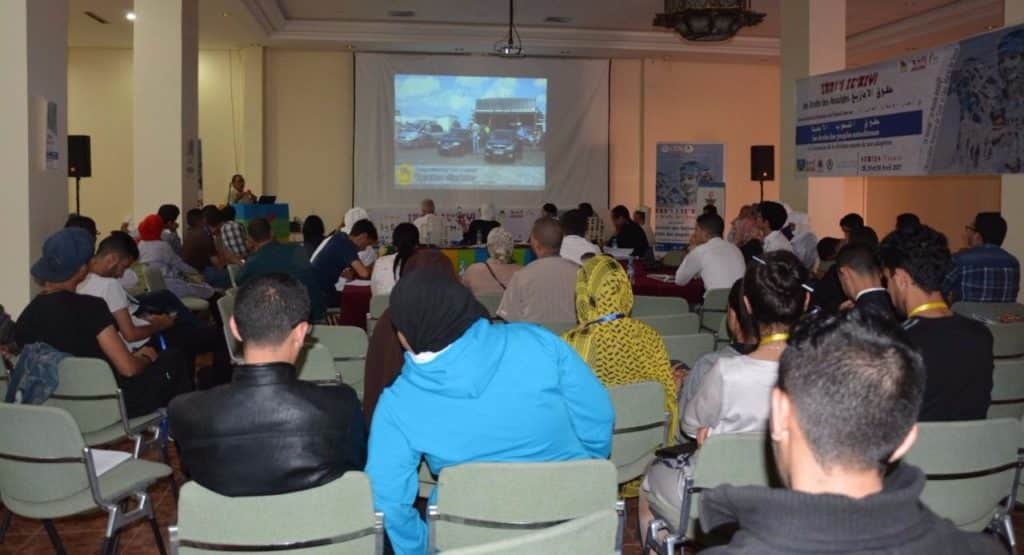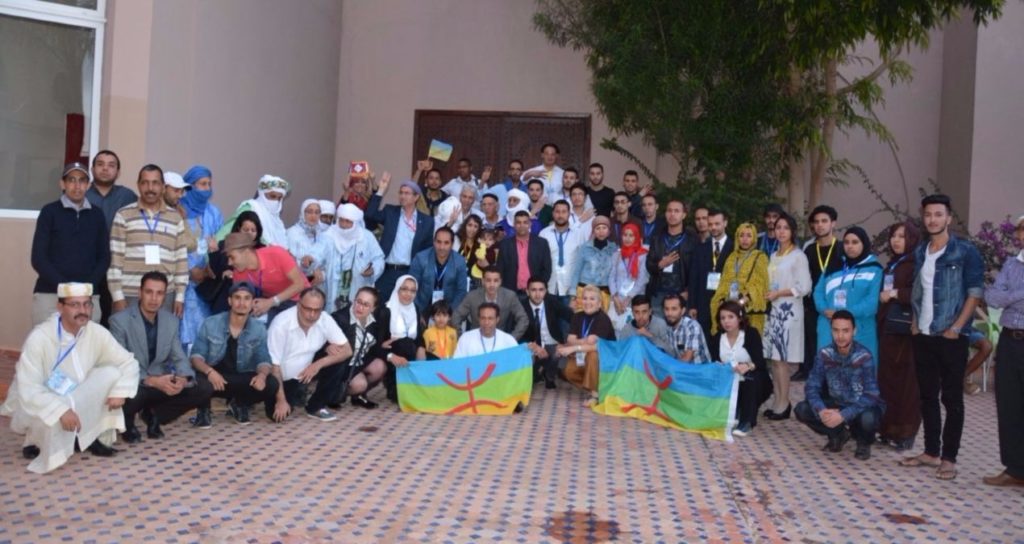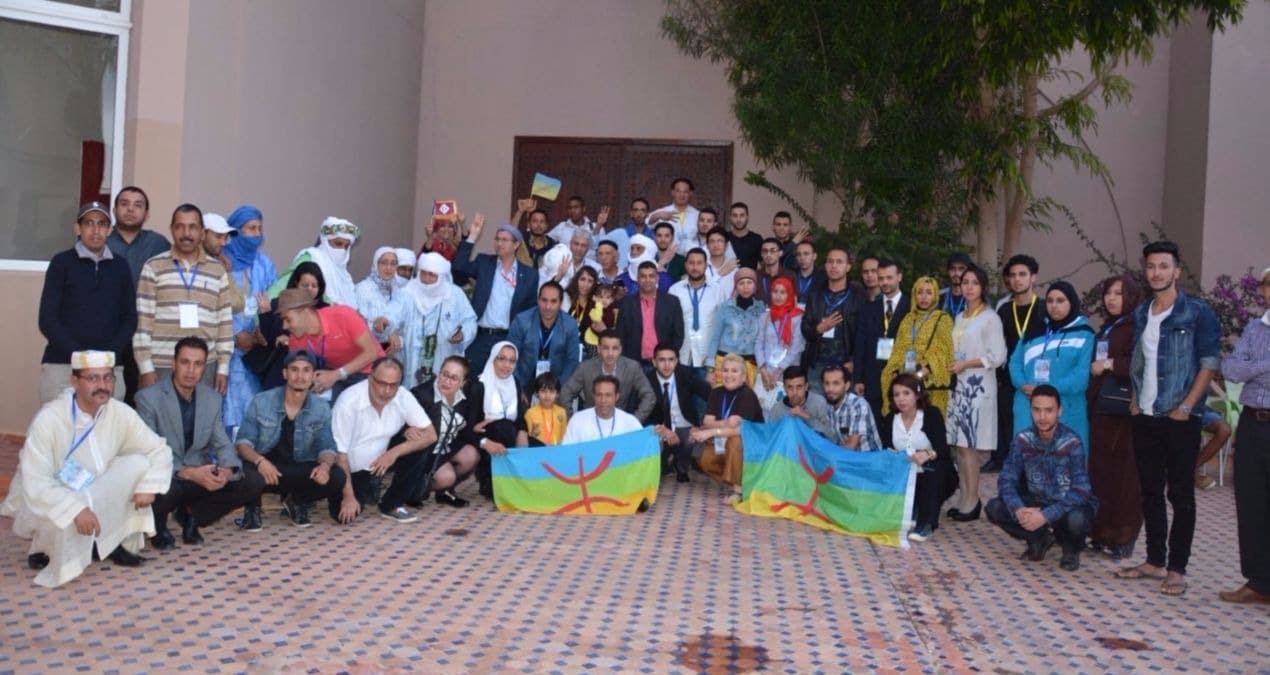By Rachid Raha, June, 20 2017
Amazigh people urge North Africa countries to respect the “UN declaration on the rights of indigenous peoples”
Tiznit, southern Morocco, hosted the international forum on the rights of Amazigh people under the theme of “UN declaration on the rights of indigenous peoples”, on the occasion of the tenth anniversary of its adoption, in Tiznit city from 28th to 30th of last April 2017.[ads1]
The forum was organized by “the Amazigh World” newspaper, Tiznit Anamour Association and Souss Abaraz Association, in collaboration with Friedrich Naumann Foundation for freedom, Tiznit Provincial Council, Tiznit Municipality and the Amazigh World Congress. The said forum took place at the same time of the sixth anniversary of the democratic spring of peoples. It is also part of the preparation for the ninth general congress of the Amazigh World Assembly which will take place in the Tunisian capital in November 2017. 
During the program of the forum, the participants concluded with a number of points and recommendations from a fruitful exchange on different issues and files concerning the Amazighs especially Tamazgha territory. Thereupon, we declare to the public opinion as follows:
- We affirm that the Amazigh, as indigenous peoples of North Africa, although they are the majority of the population of the region, are always facing many violations which conflict with the “UN declaration on the right of the indigenous peoples” and the “Universal declaration of human rights” as well as the other international covenants and charters concerning cultural, linguistic, economic, social and political rights.
- Although that the North African states have ratified several international human rights charters, their constitutions have not reached the degree of cohesion with these charters in terms of overriding international rights compared with the national legislations.
- All the North African states, although their constitutions grant this official status to the amazigh language and recognize rights, experience a contradiction between the legal texts and the policies of these countries in reality. This adds to the suffering of the amazighs vis-à-vis states which enact official laws and act according to a customary law. The fact which deepens such suffering resides inn the ongoing targeting of amazigh activists who defend values and principles as well as universal covenants in their struggle in the face of dictatorial and racist regims, parties and entities based on extremist Arabs nationalists’ constants and an extremist political Islam.
And the fact that the Northern African States do not enforce their laws and the fact that these laws contrast the majority of the content of the said laws and the provisions of the “UN declaration on the rights of indigenous people” as well as the international charters and the peoples, the amazighs suffer, in Morocco, in Algeria, in Libya, in Tunisia, in Azawad, in Niger and in other countries where Touareg live and in the Diaspora too, from wars and humanitarian crises. These crises are incarnated in the lack of food, famine, forced migration, repression, killings, racism, ethnic segregation, political, cultural, economic and social exclusion and marginalization in accordance with the following data:
In Libya:
- Immediately, after the collapse of Kadhafi’s regime, the Amazighs and Touareg, many times, were targets to military attacks. Besides, the suffered from the ongoing war between the other Libyan components, causing deaths and injuries. Many were forced into exile either southward for the Touareg and westward for the Amazighs.
- In all the negotiations and through the different stages of the inter-Libyan dialogue, all the parties refused to recognize the amazigh rights, especially the revision of the article 30 of the Libyan constitutional declaration, in order to provide an opportunity to recognize the Amazigh, Touareg and Toubou as official languages in Libya along with Arabic in accordance with the international charter on human rights and the “UN declaration on the rights of indigenous peoples”, ratified by the Amazigh Supreme Council of Libya.
- A number of Amazighs and Touareg were subject to killings, threats if not ethnocide from ‘the Arab Army” led by the general Khalifa Haftar who gained the support of Toubroq parliament the mandate of which is well accomplished.
- The Amazighs have opted for all forms of peaceful protests during the last six years, including sit-ins, walks, strikes and rebellion. However, the other Libyan parties (including Arab and moderate and Islamist or extremist nationalist organizations) did not change their minds and kept refusing the recognition of the Amazighs’ rights in the post-revolution Libyan constitution. The parties which benefited from the support of the middle eastern arab countries in terms of weapons and money and which participated from time to time with military aircrafts in operations.
In Tunisia:
- The post-revolution Tunisian constitution makes reference neither to the presence of amazighs nor to their language or culture in the country which has undergone arabization for centuries. Moreover, the post-revolution Tunisian constitution established the Arab identity of the country and, Arabic as the official language and Tunisia as a part of the Arab world and Maghreb. This exclusivist constitution contains an article which makes the Tunisian identity an Arab one. Another article stipulates that it would not be possible to reform or amend the previous article. Fact that eternally and symbolically condemns the recognition of the Amazighs rights in Tunisia.
- Racism and segregation against the amazighs embodied in the post-revolution constitution lead to the foundation of a number of Amazigh associations the majority of which requested the recognition of the Amazigh linguistic and cultural rights.
The Tunisian republic is contradiction with the provisions of the “UN declaration on the rights of indigenous peoples” and the “Universal declaration of Human Rights” as well as other UN charters and recommendations.
In Algeria:
- Algeria recognized the amazigh as an official language for more than a year. However, this recognition depends on an organic law which has yet to be proclaimed. Hence, this formalization remains on paper.
- The Algerian authorities kidnapped 165 Amazighs rights activists, from Oued M’Zab, including 43 detainees. Among them, there is the amazigh rights activist Dr. Kamal Eddine Fekhar who spent two years in prison alongside his friends without trial. An arbitrary rrest which respects neither the Algerian nor the international laws. A number of mozabite people detainees of rights died in prison. Others have been on hunger strike which threats their lives as it is the case of Dr. Kamal Eddine Fakhar who has been on hunger strike during 110 days. He stopped his strike without receiving any response from the Algerian authorities concerning his claims. Claims similar to those proclaimed by the amazigh and international legal organizations such as Human Rights Watch and Amnesty International. These organizations demand to bring the detainees before the court or provide evidence about their accusation, otherwise, release them.
- After these outlaw killing and detention crimes in Kabylia region, the Algerian regime carries on these methods against the Amazighs of Mzab. This through encouraging and supporting Chaamba “arab” militia which attack the Amazighs as shown by the the photographs and videos released by the Mzab amazigh activists. Thses actions resulted in dozens of deaths, injuries and exiled people. Subsequently, this regime carried out an arbitrary detention operation against activists and mozabite rights defenders without respect for the international norms and laws.
In Azawad:
- Following the suffering of Touareg of azawad from marginalization and repression of the Malian regime which compelled them to military confrontations, France intervened under “Serval” operation to put an end to the touareg aspirations as for their independence in Bamako. Before doing so, with neighboring countries, under UN sponsorship, a dialogue for peace, reconciliation, in accordance with the Algerian process which enabled the signature of a convention in Bamako in 2015. However, none of the articles of the convention was applied, apart from the establishment of a company grouping the Azawad movements and the Malian forces, led by the French forces.
- The touareg citizens suffer from severe humanitarian crises inherent in lack of food, famine and different types of humanitarian suffering. Neither France nor Mali made an effort to reduce such suffering. On the contrary, the French and UN political discourse focused on combating the terrorist groups supported by the neighboring countries including Algeria.
- The solution to the insecurity in Azawad would not be resolved with French nor Malian military intervention, only the application of the “UN declaration on the rights of the indigenous peoples” and granting the political autonomy status to Azawad may resolve this regional conflict.
In Morocco :
- The Moroccan state recognized the Amazigh as an official language in 2011 to calm down the protests of the democratic spring of peoples. But, it associated such recognition with an organic law which has not been enacted since that time. Also, the recognition of the amazigh language remains open. Far more, this recognition depends on an organic law which has been used by state institutions and some political parties to put into question all the fragile achievements of the amazigh language in education and media.
- The Moroccan state resorted to an extensive use of violence against the amazigh peaceful protests as the case of Rif protests which triggered following the murder of the citizen Mouhsin Fikri, crushed in garbage truck. The state repressed the protesters, although it should assume the responsibility of its officials by having a number of them arrested and brought to justice.
- The marginalization policy of the Moroccan state lead to the death of “Idya” in Tinghir city, as result of lack of adequate health facilities which must have been equipped with the necessary means, in a region where there is the largest silver mine in Africa.
We, within the framework of the « International forum on the rights of the Amazighs under the « UN declaration on the rights of the indigenous peoples », request all the global organizations and bodies of human rights as well as world countries, in addition to the United Nations, to intervene to protect the amazighs in North Africa. And this, by forcing the states of the region to respect the terms of the “UN declaration on the rights of indigenous peoples”, the “Universal Declaration of Human Rights” and the different national and international covenants and charters. We call the Amazighs to adopt “Tamazgha charter for a democratic, social and transnational confederation based on the right to self-government of regions” » , which was adopted by the Amazigh World Assembly during its seventh general meeting in Tiznit in December 2013.
We also call for operational measures and coordination, on the basis of the results. With any party able to put an end to the suffering of the Amazigh people as part of clarity and transparency, respect of norms and laws, respect of fidelity to references based on the international covenants of human rights of peoples especially the “UN declaration on the rights of indigenous peoples”.
And we reaffirm, therefore, the necessity to grant a representation to the amazigh in the UN structures, as peoples without a state in the Northern African countries.
To conclude, we draw the attention of all Amazigh activists as to vigilance concerning the continuous targeting of Amazigh activists and to their exploitation by entities and Arab nationalist, racist or islamo-extremist countries which reject the other.


